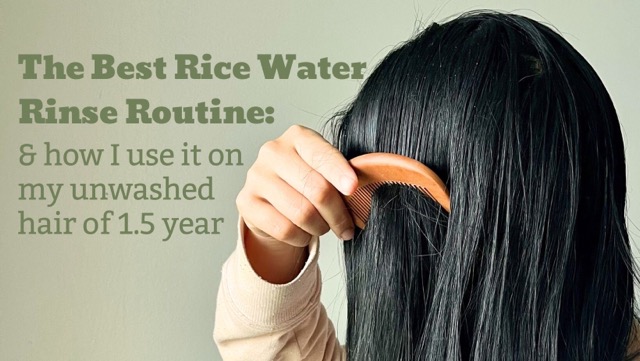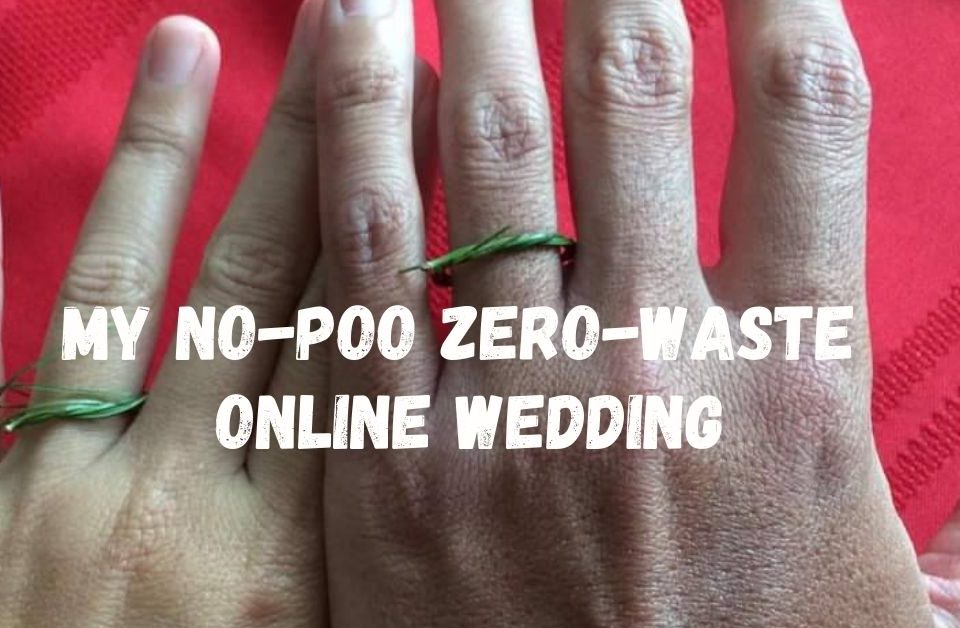Rice Water VS Rice Powder for Hair Wash
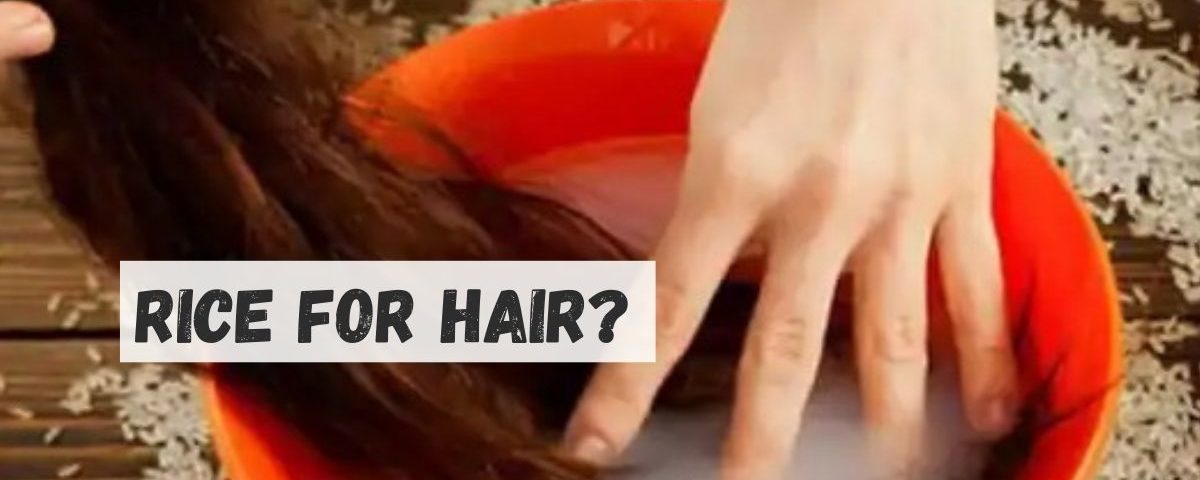
Rice rice rice, how can I survive without it?
From farm to food, to beauty, rice appears to be in all aspects of life for a typical Thai rice farmer like us. So, it shouldn’t come as a surprise if I tell you that rice is one of my favorite ingredients to use for my hair. It makes my hair soft and smooth. Not to mention, it smells amazing, especially if it’s made with freshly harvested organic Jasmine rice.
Rice comes fully packed with a bunch of nutrients; vitamins, amino acids, and other trace minerals (zinc, magnesium, vitamins B and C, etc). All of which help soothe the skin and hair. Rice also has antioxidants that are anti-aging and can help fight free radicals. The amino acid in rice means you can use it as a hair protein treatment. No wonder why Asian elders, including our Grandma, tell us that rice water is best for hair.
But how do we use it? Should we use rice water or rice powder? Is there a difference between using rice water or rice powder for hair? What kind of rice should you use to make the rice water hair rinse? What’s the best way to clean your your long hair with rice water? The questions are endless.
But today, I’ll be focusing on this one experiment, comparing the results between rice water VS rice powder. Keep in mind that my hair is not your hair. Mine is made up of many fine, black, fairly oily strands. If you don’t have the same or similar kind of hair, the result may differ.
Rice Water
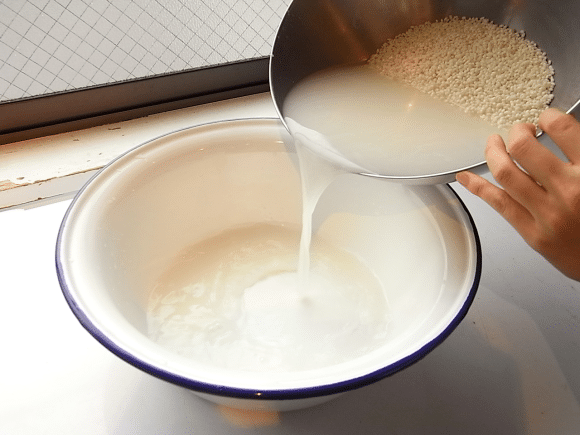
Grandma said that in the past, people applied fermented rice water to their hair for washing. Note that in Asia, people wash their rice with water before cooking it. This “rice water” – flimsy, quasi-opaque white color – looks like milk and smells just like boiled rice. The fresher the rice, the stronger the smell. When you leave this rice water on the table overnight, the smell can turn a little sour. It could be the yeast and natural probiotics kicking in. This fermentation works as a mildly acidic cleanser for the hair.
This is my current rice wash regiment (see my 2024 updated version here):
- First, I pour the rice wash into a water bottle for easy pouring.
- Then, I wash my hair with normal water.
- After that, I shake the bottle and pour the rice wash on my wet hair. I make sure all my hair is thoroughly coated.
- Next, I massage my way through the strands, focusing on the roots. (If you have long hair, you can bow your head down and start the rinse from the back of your head. It can be easier than doing from the front as I do.)
- After this, I let the rice wash soak in my hair for another 10-15 minutes.
- Lastly, I rinse it off.
With my thick, shoulder-length hair, I normally use around 1 liter of rice water each time I wash. If you have shorter or longer hair, adjust the amount of rice water according to your liking.
The Result of the Rice Water Hair Rinse?
Although my hair strands feel amazing – soft, nice, and smooth, my scalp remains fairly oily. I figured that it could be because of the diluted concentration of the rice wash or the short fermentation time (one night). If you want to explore this for yourself further, it might be worth it to experiment with shorter/longer fermentation time or more/less concentrated solution. Who knows, you might find the secret for the best hair rinse to share with us next time.
Jasmine Rice Powder
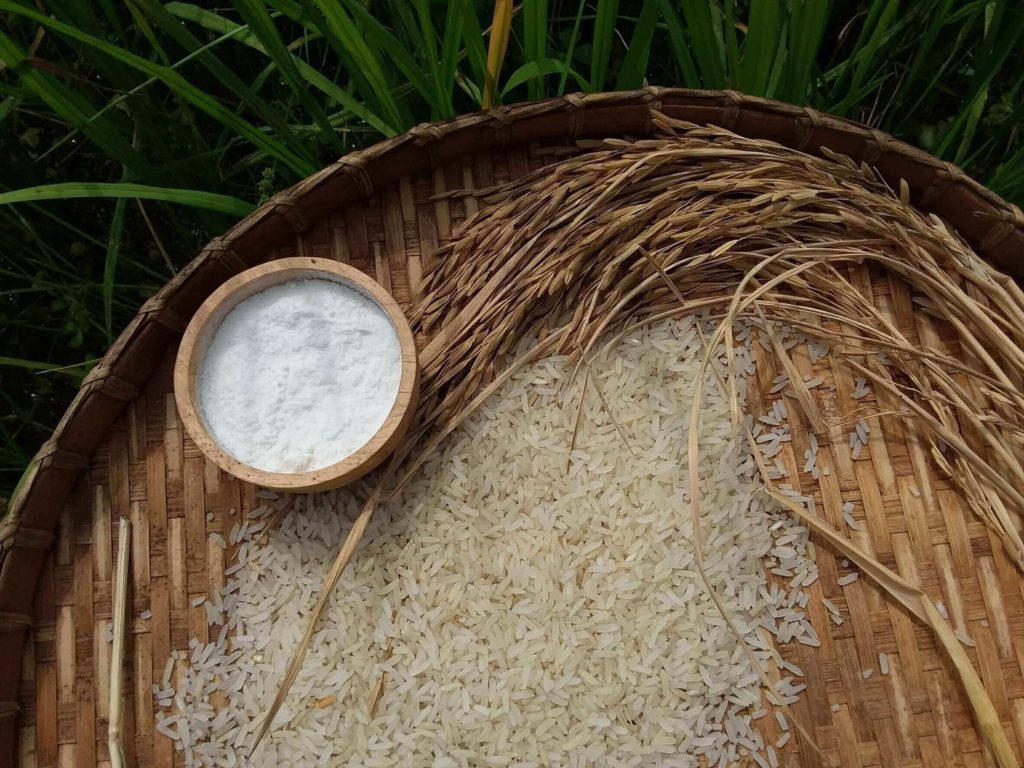
Things are a little different when I use our Happy Earth’s Jasmine Rice Powder as a hair wash. The package says it’s a face mask. But because it’s made up of nothing but rice powder, there’s literally millions of ways to use it, and we are free to use it however we please. Sometimes, we just have to experiment, in the hopes of discovering a whole new routine that works for us in the long run.
These are my jasmine rice powder regiments:
- The pasty way
- I mix the rice powder with water until it turns into a paste. You can adjust the ratio of powder and water to create a paste that easily slides on your wet hair strands.
- I apply it to wet hair and massage it into the hair roots and scalp.
- I wait for 10-15 mins
- Last, I rinse off.
The result: When I use the rice powder as a paste, I feel like I’m exfoliating the scalp. The coarse texture of the rice powder works both as a scalp scrub and oil absorbent, although it can be a bit harder to apply because my hair can turn quite heavy when wet.
- The dry way
- First, I apply the dry powder directly on wet hair.
- Then, I massage it all over my head and hair strands for 5-10 minutes.
- After that, I rinse off with water.
The result: I find that my hair feels nice, soft, and smooth, thanks to the powder texture of the rice which absorbs the natural oil on the hair. However, my scalp remains uncleaned and a lot of the time, the powder disappears on the strands. When rinsing off with water, there are still some rice powder particles remaining on the hair strands. So, I have to make sure that I rinse it off thoroughly before stepping out of the shower.
My personal note on using the Rice Powder for Hair Wash
For someone like me who deals with oily hair on a daily basis, the pasty way is better because the rice absorbs the oiliness on my locks pretty well. But, if I’m short of time, I follow the dry way because it’s a lot more straightforward to do.
On days when I happen to have more time, I tend to do both ways – applying the rice paste on the scalp and the dry powder on wet hair. I find this combination is quite a good balance because I can clean both my hair and scalp at the same time. However, it does require some time to work through my thick, wet, heavy locks. hahaha
My verdict: Rice Water or Rice Powder?
Judging between the two rice hair wash options, I prefer the rice powder because of its versatility and ease of use, and it fits my lifestyle better.
However, if you are a hardcore zero-waster, a rice water rinse may be the option for you, as it is simply the by-product of rice cooking. (Quick tip: You can also use rice water to water plants or to do the first rinse on an oily dish surface.)
Which rice hair wash regiment should I follow?
Well, this question depends a lot on what you’d like to do. If you would like to exfoliate the scalp, I would recommend using the paste and apply on the scalp. But if you want to focus on the hair strands, apply the dry powder on wet hair or rice water rinse. Your scalp may not feel as clean but if you don’t mind, your hair will feel and look amazing, soft, shiny, smooth, and simply nice to touch.
If you are curious about using rice in your hair routine, try it both ways and give me a shout about which one you prefer better and how you use it for your hair. And if you can’t find the freshest organic rice powder for your hair wash’s need, check out our organic aromatic Jasmine Rice Powder here!
Hope this No-Poo Rant episode is useful for all No-Poo followers out there. Let me know how you like it. Have you tried the rice hair wash before? How did you do it? What kind of hair do you have? Let me know!
And if you want to get close and intimate with us and follow our journey to live, learn, and grow with Mother Nature? Sign up to our newsletter for your little dose of natural living inspiration, farm living, and DIY beauty tips and you’ll get a code for free gift with your first purchase too!
That’s it for now! Until next time! xo, -mon
Source:
https://phanganist.com/somewhere-phangan-nature-body-mind-treatments-leo-article/flawless-skin-and-healthy-hair-benefits-rice-water
https://food.ndtv.com/food-drinks/rice-water-benefits-for-digestion-hair-and-skin-2285507


